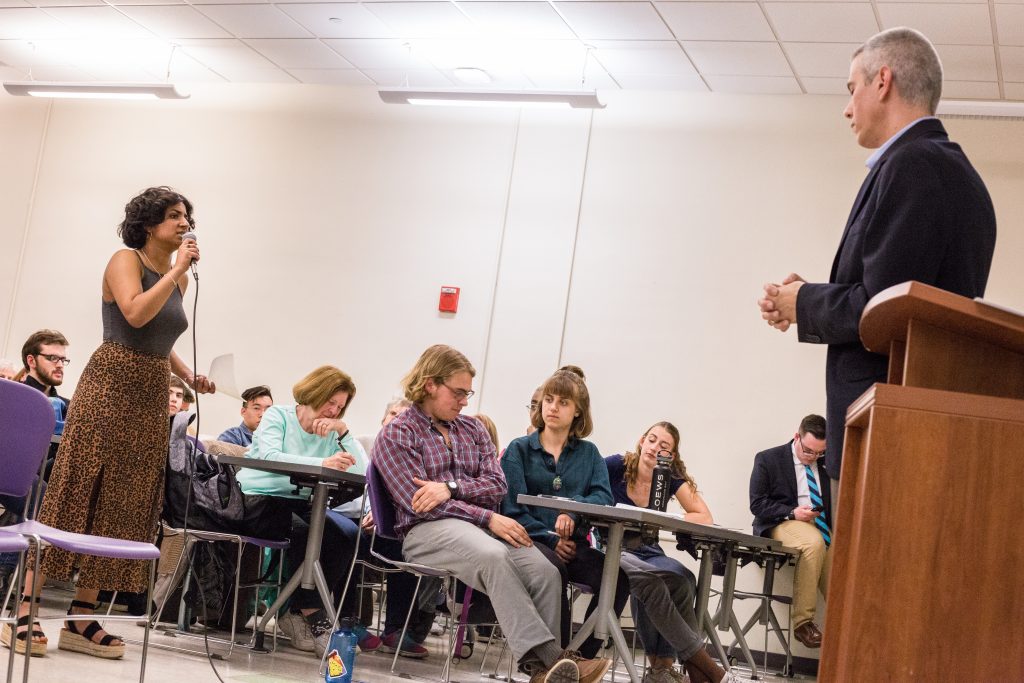Rep. Anthony Brindisi (D-NY) visited Binghamton University on Thursday evening for a public forum on the climate crisis, his first visit to the University since being elected to represent New York’s 22nd congressional district in 2018.
The forum was organized by Generation Repairing Our World (GROW) and was co-sponsored by the New York Public Interest Research Group (NYPIRG) and Generation Vote.
Before Brindisi spoke, Molly Patterson, an assistant professor of geological sciences and environmental studies at BU, and Carl Lipo, associate dean for research and programs in Harpur College, director of the University’s environmental studies program and a professor of environmental studies and anthropology, led a brief introduction to the climate crisis. Patterson showed the evidence of temperatures and carbon dioxide levels having increased dramatically in the last 40 years while presenting predictive models of climate changes and the resulting economic costs.
Lipo discussed feedback mechanisms which could be implemented to help slow climate change and prevent environmental damage. Patterson and Lipo encouraged students to utilize their power and to continue initiating conversations, questioning lawmakers and demanding change.
While Brindisi spoke, members of the different organizations at the University posed questions to him on topics such as the Green New Deal, food and agriculture, disaster preparedness and cooperation with constituents on these issues.
Brindisi was asked whether he supported the Green New Deal, a proposed program in Congress in the wake of the Intergovernmental Panel on Climate Change (IPCC) report released last year. While Brindisi said he recognized climate change as the greatest global threat we face today, he is not a co-sponsor of the deal. He also said he believes the text does not include enough detail for him to feel confident in it, citing its omission of hydroelectric and nuclear energy as sources of clean energy.
As a member of the House Committee on Agriculture, Brindisi was also asked how will he reform the United States’ food system to cut fossil fuel dependence to zero. Brindisi said lawmakers should be focusing on carbon emissions on farms, and in order to increase preparedness for flooding and other climate catastrophes in the area, he said he plans to support investment in infrastructure to mitigate such catastrophes.
Brindisi added that more forums should be organized to educate people on the science behind the issue.
“This is one way we can stay engaged in the process, so I can be there listening to your concerns, [and] I can take what you’re saying down to Washington, and then we have to mobilize,” Brindisi said. “Because it’s very difficult when you have divided government, and you have some folks in Washington who have their heads buried in the sand when it comes to this issue — it’s scary. They don’t believe in the science whatsoever.”
Brindisi also answered various questions from audience members, including students and community members, ranging from fishing industry concerns to the possibility of a carbon tax. He emphasized the importance of investing in green infrastructure and said he supports the Climate Action Now Act, which aims to put the United States back in the Paris Agreement.
George Elliot, a freshman double-majoring in environmental studies and anthropology, said he hoped the forum would generate an informative and productive discussion for students and community members while expressing constituent concerns to move Brindisi’s stances in a favorable direction.
“We want this to be an educational event, both for the audience members as well as for the congressman,” Elliot said. “We also wanted this to be an opportunity for Brindisi to impress us with his responses and an opportunity for us to follow up with [our] responses. It was kind of like a foot in the water for him to establish where he stands on these issues, where we can move him on these issues and what tactics are appropriate for these issues in this area.”
Isabel Jordan, a member of Generation Vote and GROW and a freshman majoring in environmental studies, said the forum was an attempt to maintain an active and positive relationship with Brindisi and community members following his election.
“We don’t want to let a relationship between constituents and elected officials to die after an election — it needs to keep going, and they need to be held accountable, so we appreciate, as young people, that he took the time out of his busy schedule to actually be here,” Jordan said. “That being said, we do need to push him to be bolder and be creative, because climate is very politicized.”



